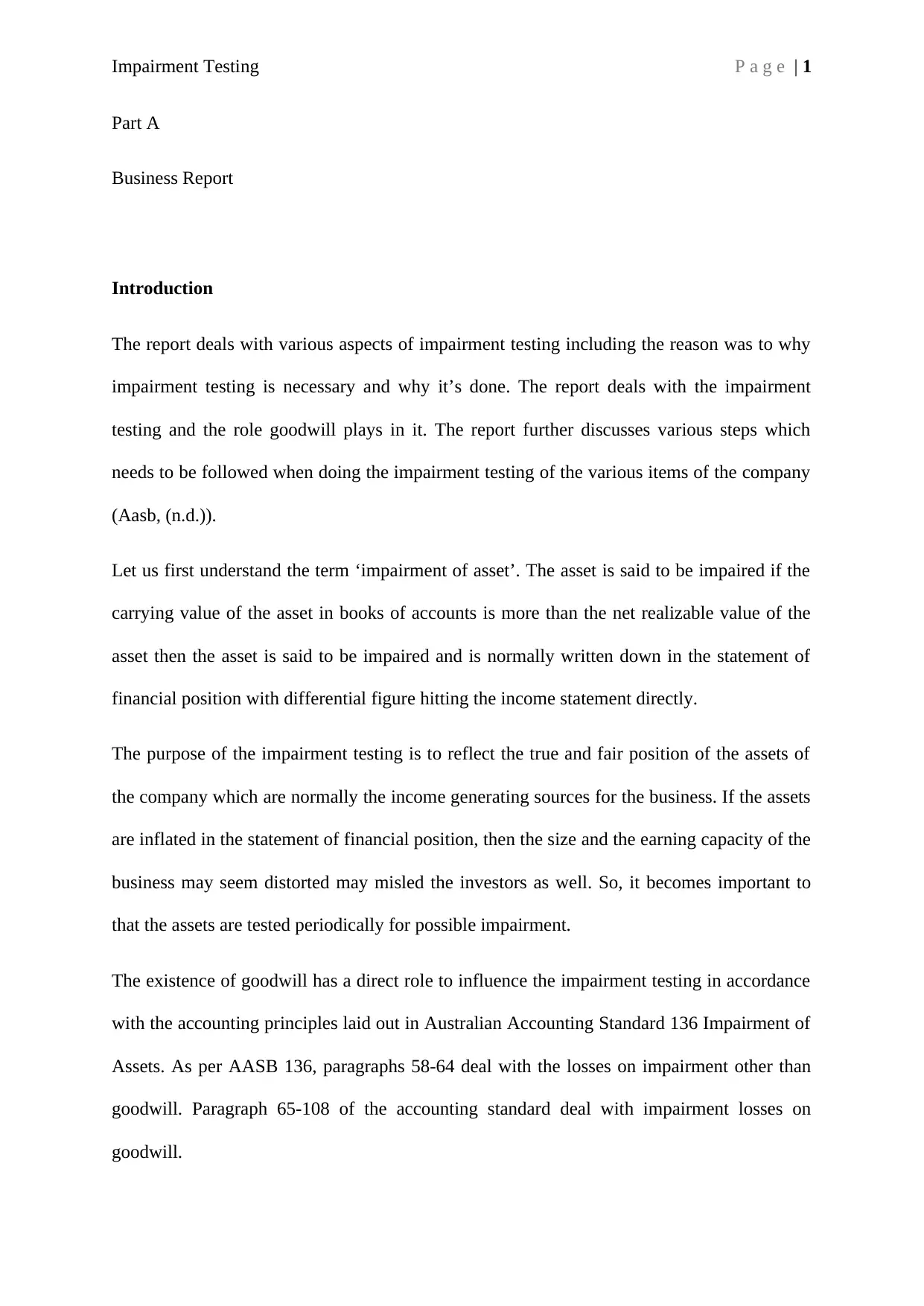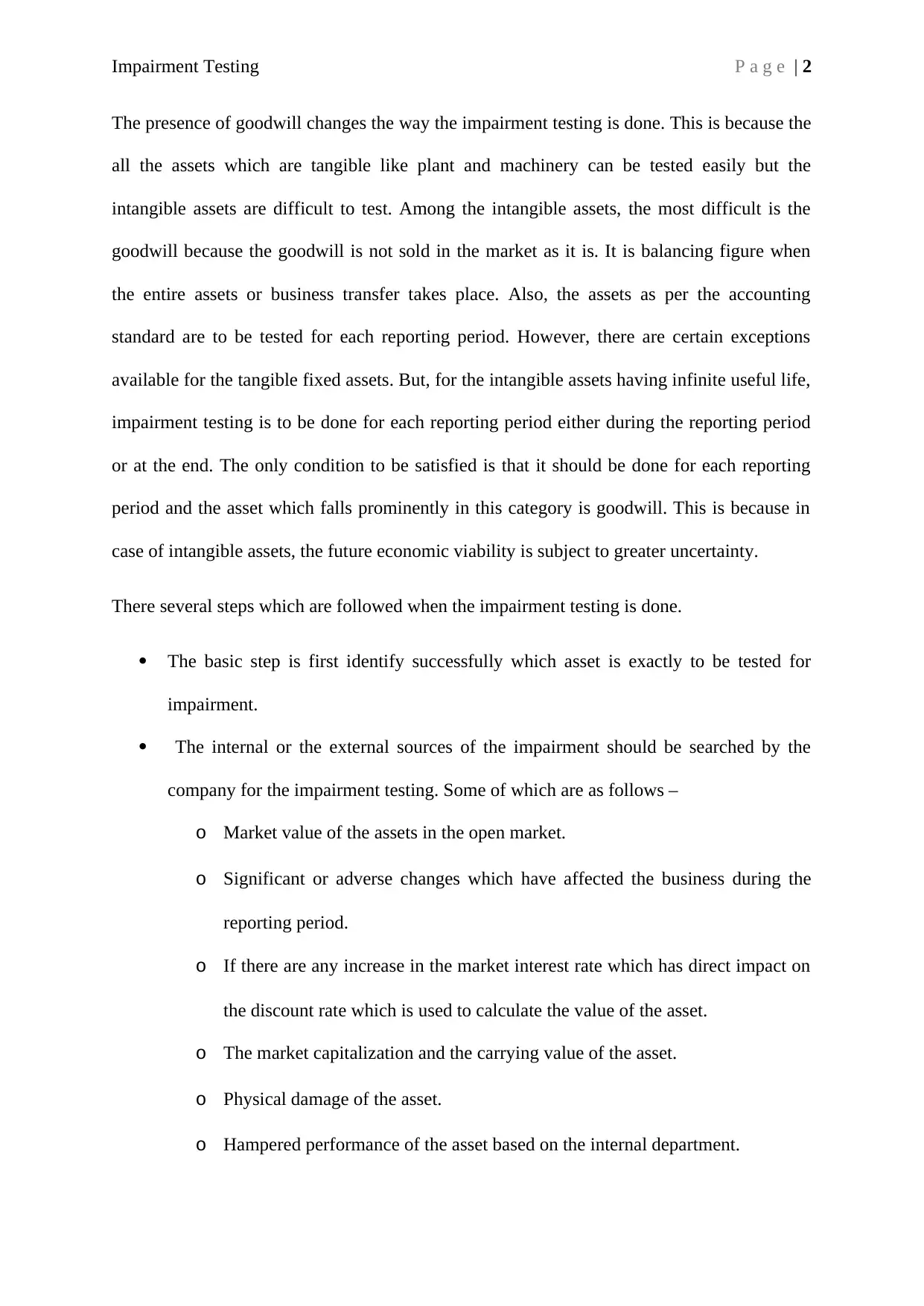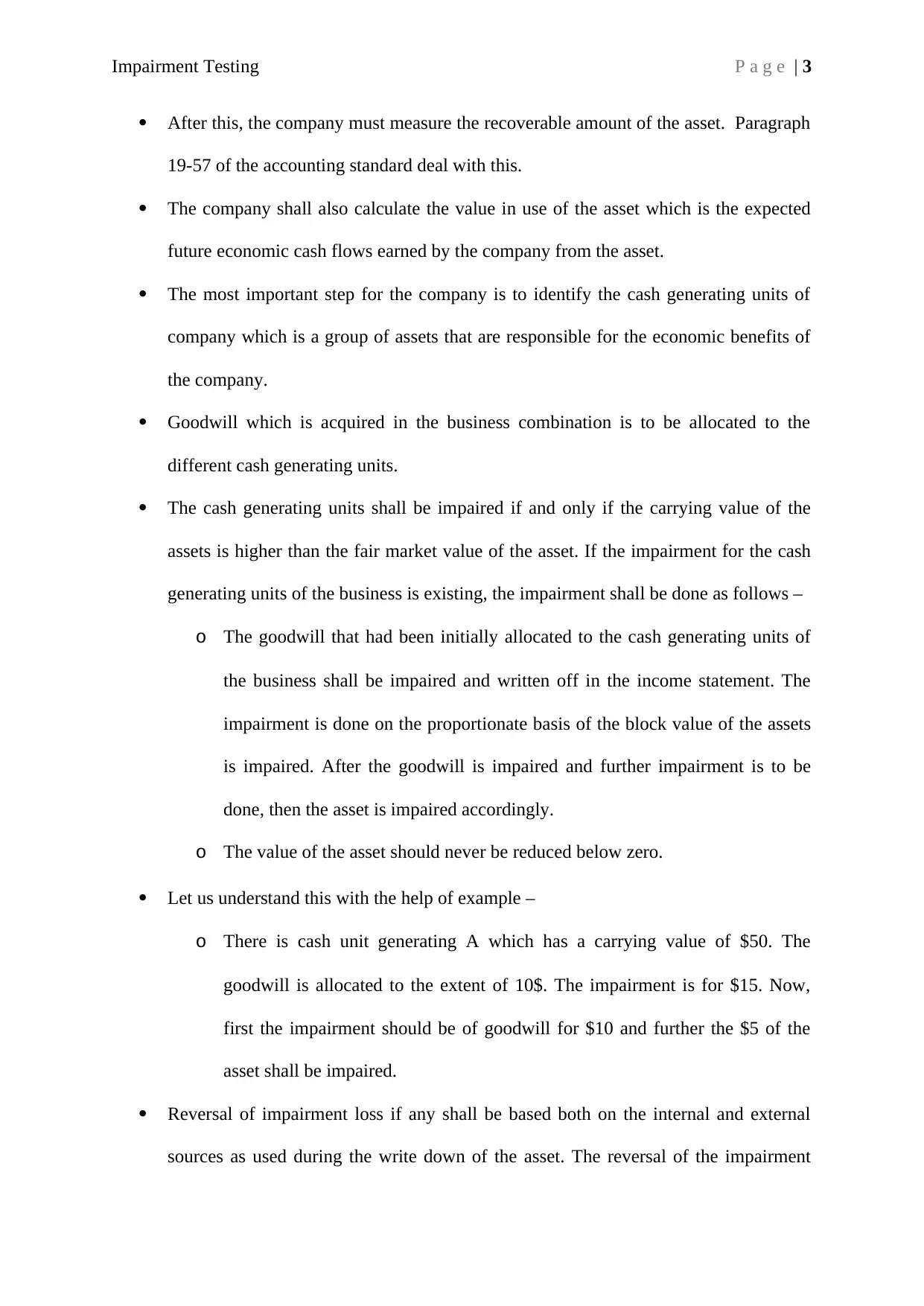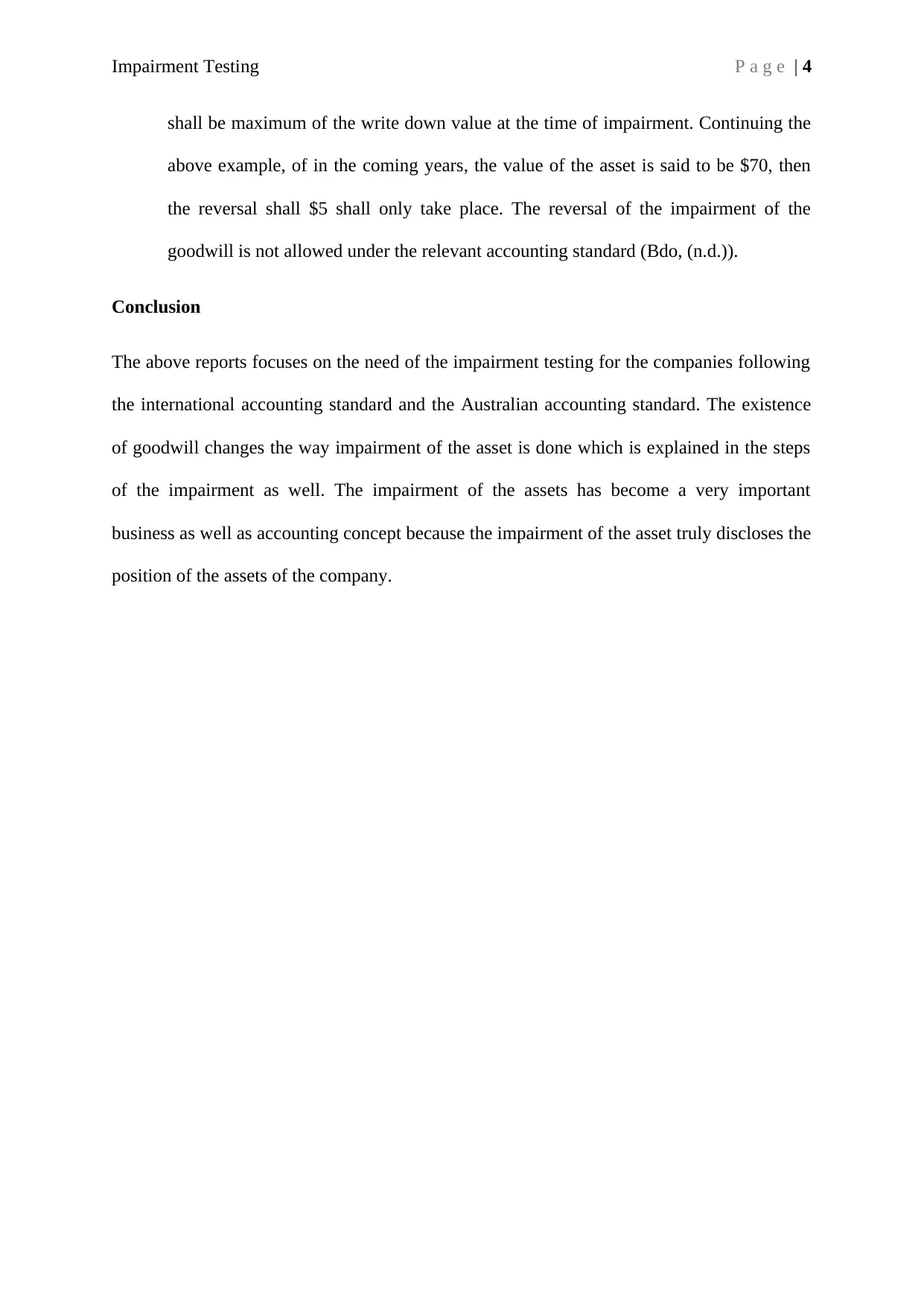Impairment Testing Business Report
VerifiedAdded on 2019/09/19
|5
|1153
|416
Report
AI Summary
This report provides a detailed analysis of impairment testing, focusing on its importance in financial reporting and the role of goodwill. It explains why impairment testing is necessary, how it ensures the true and fair valuation of assets, and the specific steps involved in the process. The report also discusses the impact of goodwill on impairment testing, particularly in the context of Australian Accounting Standard 136. It covers the identification of impairment indicators, measurement of recoverable amounts, and the allocation of goodwill to cash-generating units. The report concludes by emphasizing the significance of impairment testing in accurately reflecting a company's financial position and provides examples to illustrate the concepts discussed.

Impairment Testing P a g e | 1
Part A
Business Report
Introduction
The report deals with various aspects of impairment testing including the reason was to why
impairment testing is necessary and why it’s done. The report deals with the impairment
testing and the role goodwill plays in it. The report further discusses various steps which
needs to be followed when doing the impairment testing of the various items of the company
(Aasb, (n.d.)).
Let us first understand the term ‘impairment of asset’. The asset is said to be impaired if the
carrying value of the asset in books of accounts is more than the net realizable value of the
asset then the asset is said to be impaired and is normally written down in the statement of
financial position with differential figure hitting the income statement directly.
The purpose of the impairment testing is to reflect the true and fair position of the assets of
the company which are normally the income generating sources for the business. If the assets
are inflated in the statement of financial position, then the size and the earning capacity of the
business may seem distorted may misled the investors as well. So, it becomes important to
that the assets are tested periodically for possible impairment.
The existence of goodwill has a direct role to influence the impairment testing in accordance
with the accounting principles laid out in Australian Accounting Standard 136 Impairment of
Assets. As per AASB 136, paragraphs 58-64 deal with the losses on impairment other than
goodwill. Paragraph 65-108 of the accounting standard deal with impairment losses on
goodwill.
Part A
Business Report
Introduction
The report deals with various aspects of impairment testing including the reason was to why
impairment testing is necessary and why it’s done. The report deals with the impairment
testing and the role goodwill plays in it. The report further discusses various steps which
needs to be followed when doing the impairment testing of the various items of the company
(Aasb, (n.d.)).
Let us first understand the term ‘impairment of asset’. The asset is said to be impaired if the
carrying value of the asset in books of accounts is more than the net realizable value of the
asset then the asset is said to be impaired and is normally written down in the statement of
financial position with differential figure hitting the income statement directly.
The purpose of the impairment testing is to reflect the true and fair position of the assets of
the company which are normally the income generating sources for the business. If the assets
are inflated in the statement of financial position, then the size and the earning capacity of the
business may seem distorted may misled the investors as well. So, it becomes important to
that the assets are tested periodically for possible impairment.
The existence of goodwill has a direct role to influence the impairment testing in accordance
with the accounting principles laid out in Australian Accounting Standard 136 Impairment of
Assets. As per AASB 136, paragraphs 58-64 deal with the losses on impairment other than
goodwill. Paragraph 65-108 of the accounting standard deal with impairment losses on
goodwill.
Paraphrase This Document
Need a fresh take? Get an instant paraphrase of this document with our AI Paraphraser

Impairment Testing P a g e | 2
The presence of goodwill changes the way the impairment testing is done. This is because the
all the assets which are tangible like plant and machinery can be tested easily but the
intangible assets are difficult to test. Among the intangible assets, the most difficult is the
goodwill because the goodwill is not sold in the market as it is. It is balancing figure when
the entire assets or business transfer takes place. Also, the assets as per the accounting
standard are to be tested for each reporting period. However, there are certain exceptions
available for the tangible fixed assets. But, for the intangible assets having infinite useful life,
impairment testing is to be done for each reporting period either during the reporting period
or at the end. The only condition to be satisfied is that it should be done for each reporting
period and the asset which falls prominently in this category is goodwill. This is because in
case of intangible assets, the future economic viability is subject to greater uncertainty.
There several steps which are followed when the impairment testing is done.
The basic step is first identify successfully which asset is exactly to be tested for
impairment.
The internal or the external sources of the impairment should be searched by the
company for the impairment testing. Some of which are as follows –
o Market value of the assets in the open market.
o Significant or adverse changes which have affected the business during the
reporting period.
o If there are any increase in the market interest rate which has direct impact on
the discount rate which is used to calculate the value of the asset.
o The market capitalization and the carrying value of the asset.
o Physical damage of the asset.
o Hampered performance of the asset based on the internal department.
The presence of goodwill changes the way the impairment testing is done. This is because the
all the assets which are tangible like plant and machinery can be tested easily but the
intangible assets are difficult to test. Among the intangible assets, the most difficult is the
goodwill because the goodwill is not sold in the market as it is. It is balancing figure when
the entire assets or business transfer takes place. Also, the assets as per the accounting
standard are to be tested for each reporting period. However, there are certain exceptions
available for the tangible fixed assets. But, for the intangible assets having infinite useful life,
impairment testing is to be done for each reporting period either during the reporting period
or at the end. The only condition to be satisfied is that it should be done for each reporting
period and the asset which falls prominently in this category is goodwill. This is because in
case of intangible assets, the future economic viability is subject to greater uncertainty.
There several steps which are followed when the impairment testing is done.
The basic step is first identify successfully which asset is exactly to be tested for
impairment.
The internal or the external sources of the impairment should be searched by the
company for the impairment testing. Some of which are as follows –
o Market value of the assets in the open market.
o Significant or adverse changes which have affected the business during the
reporting period.
o If there are any increase in the market interest rate which has direct impact on
the discount rate which is used to calculate the value of the asset.
o The market capitalization and the carrying value of the asset.
o Physical damage of the asset.
o Hampered performance of the asset based on the internal department.

Impairment Testing P a g e | 3
After this, the company must measure the recoverable amount of the asset. Paragraph
19-57 of the accounting standard deal with this.
The company shall also calculate the value in use of the asset which is the expected
future economic cash flows earned by the company from the asset.
The most important step for the company is to identify the cash generating units of
company which is a group of assets that are responsible for the economic benefits of
the company.
Goodwill which is acquired in the business combination is to be allocated to the
different cash generating units.
The cash generating units shall be impaired if and only if the carrying value of the
assets is higher than the fair market value of the asset. If the impairment for the cash
generating units of the business is existing, the impairment shall be done as follows –
o The goodwill that had been initially allocated to the cash generating units of
the business shall be impaired and written off in the income statement. The
impairment is done on the proportionate basis of the block value of the assets
is impaired. After the goodwill is impaired and further impairment is to be
done, then the asset is impaired accordingly.
o The value of the asset should never be reduced below zero.
Let us understand this with the help of example –
o There is cash unit generating A which has a carrying value of $50. The
goodwill is allocated to the extent of 10$. The impairment is for $15. Now,
first the impairment should be of goodwill for $10 and further the $5 of the
asset shall be impaired.
Reversal of impairment loss if any shall be based both on the internal and external
sources as used during the write down of the asset. The reversal of the impairment
After this, the company must measure the recoverable amount of the asset. Paragraph
19-57 of the accounting standard deal with this.
The company shall also calculate the value in use of the asset which is the expected
future economic cash flows earned by the company from the asset.
The most important step for the company is to identify the cash generating units of
company which is a group of assets that are responsible for the economic benefits of
the company.
Goodwill which is acquired in the business combination is to be allocated to the
different cash generating units.
The cash generating units shall be impaired if and only if the carrying value of the
assets is higher than the fair market value of the asset. If the impairment for the cash
generating units of the business is existing, the impairment shall be done as follows –
o The goodwill that had been initially allocated to the cash generating units of
the business shall be impaired and written off in the income statement. The
impairment is done on the proportionate basis of the block value of the assets
is impaired. After the goodwill is impaired and further impairment is to be
done, then the asset is impaired accordingly.
o The value of the asset should never be reduced below zero.
Let us understand this with the help of example –
o There is cash unit generating A which has a carrying value of $50. The
goodwill is allocated to the extent of 10$. The impairment is for $15. Now,
first the impairment should be of goodwill for $10 and further the $5 of the
asset shall be impaired.
Reversal of impairment loss if any shall be based both on the internal and external
sources as used during the write down of the asset. The reversal of the impairment
⊘ This is a preview!⊘
Do you want full access?
Subscribe today to unlock all pages.

Trusted by 1+ million students worldwide

Impairment Testing P a g e | 4
shall be maximum of the write down value at the time of impairment. Continuing the
above example, of in the coming years, the value of the asset is said to be $70, then
the reversal shall $5 shall only take place. The reversal of the impairment of the
goodwill is not allowed under the relevant accounting standard (Bdo, (n.d.)).
Conclusion
The above reports focuses on the need of the impairment testing for the companies following
the international accounting standard and the Australian accounting standard. The existence
of goodwill changes the way impairment of the asset is done which is explained in the steps
of the impairment as well. The impairment of the assets has become a very important
business as well as accounting concept because the impairment of the asset truly discloses the
position of the assets of the company.
shall be maximum of the write down value at the time of impairment. Continuing the
above example, of in the coming years, the value of the asset is said to be $70, then
the reversal shall $5 shall only take place. The reversal of the impairment of the
goodwill is not allowed under the relevant accounting standard (Bdo, (n.d.)).
Conclusion
The above reports focuses on the need of the impairment testing for the companies following
the international accounting standard and the Australian accounting standard. The existence
of goodwill changes the way impairment of the asset is done which is explained in the steps
of the impairment as well. The impairment of the assets has become a very important
business as well as accounting concept because the impairment of the asset truly discloses the
position of the assets of the company.
Paraphrase This Document
Need a fresh take? Get an instant paraphrase of this document with our AI Paraphraser

Impairment Testing P a g e | 5
References
Aasb, (n.d.). Impairment of Assets. [Online] Available at
http://www.aasb.gov.au/admin/file/content102/c3/AASB136_07-04_ERDRjun10_07-
09.pdf Access Date 20th January, 2017.
Bdo, (n.d.). Blind Freddy – Common Errors in Accounting for Impairment [Online] Available
at https://www.bdo.com.au/en-au/accounting-news/accounting-news-may-2016/blind-
freddy Access Date 20th January, 2017
References
Aasb, (n.d.). Impairment of Assets. [Online] Available at
http://www.aasb.gov.au/admin/file/content102/c3/AASB136_07-04_ERDRjun10_07-
09.pdf Access Date 20th January, 2017.
Bdo, (n.d.). Blind Freddy – Common Errors in Accounting for Impairment [Online] Available
at https://www.bdo.com.au/en-au/accounting-news/accounting-news-may-2016/blind-
freddy Access Date 20th January, 2017
1 out of 5
Related Documents
Your All-in-One AI-Powered Toolkit for Academic Success.
+13062052269
info@desklib.com
Available 24*7 on WhatsApp / Email
![[object Object]](/_next/static/media/star-bottom.7253800d.svg)
Unlock your academic potential
Copyright © 2020–2026 A2Z Services. All Rights Reserved. Developed and managed by ZUCOL.



